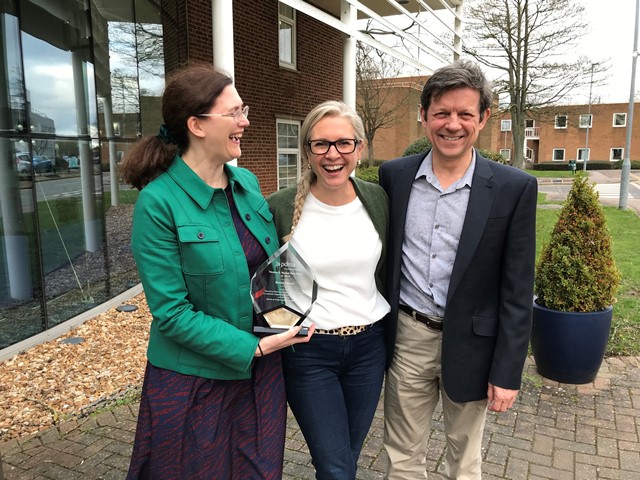Partnerships in the face of a crisis: What we share over what divides us.
01/10/2020

The COVID-19 crisis has demanded response from all sectors of society, from government, business, schools and community groups and us as individual citizens. It’s reminded us how fragile our society and our planet truly are, and that these challenges affect all sectors of society.
Government and businesses recognize that meeting the social and environmental challenges facing us today depends on concerted action and innovation through partnerships[1]. And that always means listening to people – in the supply chain, with charities and NGOs – with very different outlooks, objectives and sense of purpose.
So there can be an impasse. Sustainability starts looking like a messy ideal that’s going to mean costly compromises. The boards of businesses can start to back away.
Although critical in terms of their resources, their level of impact and influence, businesses can’t change themselves without external input. They need strong partners. Intermediaries who can be at the heart of sector-wide coalitions. And also independent NGOs and activist bodies willing to see businesses as part of the solution, able to both call out firms when needed, and work with them to share data and look at solutions.
New skills are needed among corporate sustainability professionals to better manage partnerships: to access the expertise and resources needed to solve complex problems, and achieve the kinds of recognition that lead to wider support and involvement from other businesses in environment-related initiatives.
As a result, more businesses will look beyond fundamental differences in values, beyond surface tensions, to the underlying picture and where there are shared and complementary aims. Sustainability benefits will often mean business benefits. So while Marks & Spencer is focused primarily on profit, by offering a £5 voucher to customers who return their used M&S clothes to an Oxfam shop there’s a chain reaction of benefits: fewer clothes go into landfill, Oxfam receive valuable stock, and customers return to M&S with their voucher, increasing footfall. In 2015, Argos began working with circular economy charity WRAP on its Gadget Trade-In pilot where customers trade in old tech for new, ensuring re-use and recycling. A relationship with the National Trust has helped Adnams brewery affirm its position as a heritage brand with a wider role in waste and energy reduction.
Why not work with competitors on issues that don’t cross over into issues of financial advantage? A classic model of collaboration has been the Refrigerants Naturally! coalition involving Unilever, Coca Cola and Pepsi (with Greenpeace and the UN) over finding methods for refrigeration without releasing CFCs and HFCs.
The first step, then, is recognising the problem. Stakeholders may have very different ways of seeing the world, even be shouting for the kinds of action on sustainability that bump up against the business. But differences are an opportunity as well as a challenge. There also needs to be an understanding of how there can be challenges from internal functions: what looks viable to procurement might not sit well with marketing.
Managers working in sustainability need to be developing skills in managing stakeholder engagements: how to harness differences in outlooks, and ‘frame’ where the value lies. This in turn can be used to reframe problems, combine competencies in new ways, and co-create innovative solutions. Importantly, there’s the chance to learn from stakeholders, helping the business to question assumptions around the environmental problems and dilemmas being faced.
Sustainability initiatives are often project-based, meaning that when projects are completed the staff involved on all sides return to the day-job and learning is lost. Systems are needed to make the knowledge-sharing, the insights into the business and natural environment contexts, should be ongoing.
Attention is needed to the issue of the balance of power. Companies traditionally work with suppliers, expecting simply to tell the partner what to do in return for their business. The supplier won’t speak up and there’s no understanding of underlying potential for shared benefits, social and environmental. Similarly with not-for-profits, there needs to be a sharing of views among equals.
Rosina Watson is Senior Lecturer at Cranfield University School of Management and former Head of Sustainability at Home Retail Group, www.cranfield.ac.uk
Links to Rosina’s related research
Journal of Product Innovation Management (2017) Watson et al.Engaging stakeholders in environmental innovation http://dx.doi.org/10.1111/jpim.12394
Journal of Business Research (in press) Watson et al.Business-nonprofit engagement in sustainability-oriented innovation: What works for whom and why? https://doi.org/10.1016/j.jbusres.2018.11.023
[1] Sustainable Development Goal 17 is about using Partnerships to achieve the other 16 goals
Categories & Tags:
Leave a comment on this post:
You might also like…
From Sri Lanka to Cranfield: How a Commonwealth Scholarship transformed my environmental engineering journey
Hi, I’m Kavithanjali Uthayashangar and I’m here to tell you about my journey into environmental engineering. It began with a simple but powerful motivation: a desire to understand how engineering can ...
Inside the Air Transport Management MSc: Classes, assignments, and group project work
What’s it really like to study Air Transport Management at Cranfield? Adit walks us through a typical day, assignment expectations, and the excitement of hands-on group projects. This is the second of three blog ...
Using Factiva to research a company
If you’re tasked with researching a company, your first port of call might be to search Fame or EBSCO Business Source Complete. Your immediate reaction might not be to look at Factiva. However, for larger ...
How do I write a secondary reference … in the NLM style?
Secondary referencing is used when you’re reading a work which includes a quotation from another author, and you – the researcher – can’t obtain the original source. We always advise, where possible, to try to ...
Reaching new heights: How a Global Excellence Scholarship fuelled my aerospace dreams
Leaving my home in India to pursue an MSc in Aerospace Dynamics at Cranfield University was a leap of faith. Hi, I’m Oliza Kachroo and as an international student, the transition ...
How do I reference…when delivering a presentation?
Just as you cite and reference sources in written work, you should also acknowledge the sources you use or quote in oral presentations. Citing your sources in presentations provides your audience with information about the ...






